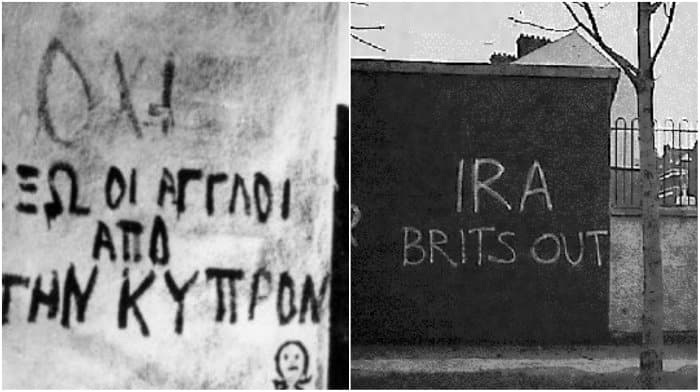The Municipality of Paralimni and "Aegeon" Publications invite you to the presentation of Helen O'Shea's book "Ireland and the End of the British Empire – Irish Involvement in the EOKA Struggle".
The event will take place on Thursday, October 19, 2023 at 7 p.m. in the event hall of Paralimni Town Hall.
Speakers:
- Dr Charalambos Alexandrou, President of the EOKA Liberation Struggle Foundation 1955-59
- Dr. Lambros G. Kaoullas, Director of EEC, University of Limassol
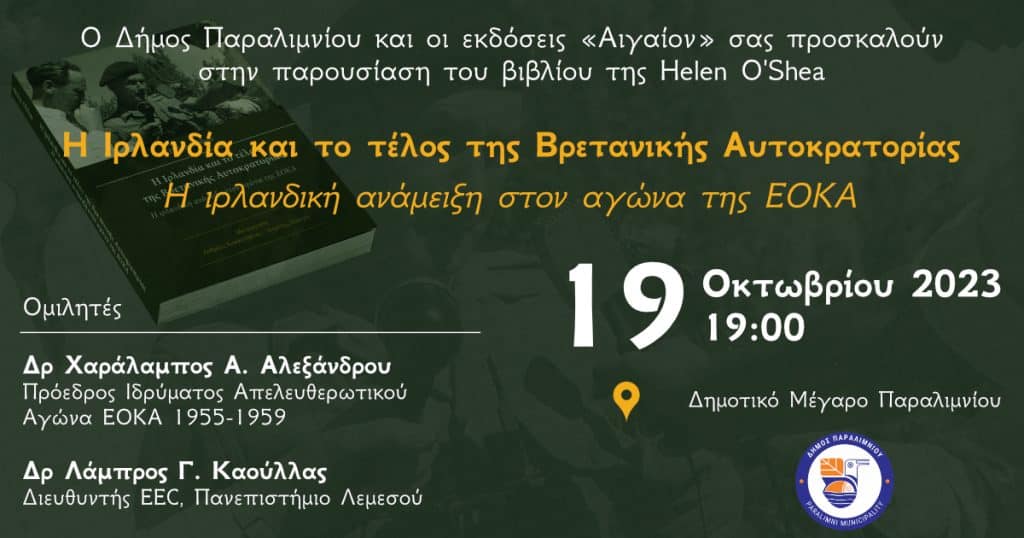
The book
Helen O'Shea's book, translated by Andreas Kokkinoftas and Michalis Stavris, is a case study of Irish participation in the institutions of the British Empire. This particular aspect of Irish history is examined with a focus on the case of Cyprus and the involvement of Irish officials and the military throughout British rule. The period of the national liberation struggle of EOKA (1955-1959) functions as the axis of Dr. Helen O'Shea's study.
In addition to the facts related to Ireland that the author brings to light, she highlights many unknown aspects of the Cypriot history of the period 1878-1959.
How have various Irish Philhellenes contributed over time to the promotion of the national demand of the Greeks of Cyprus? What was the attitude of the Irish press? How were political-religious expediencies and cold war interests linked to the Cyprus struggle? What was the attitude of the Irish representatives in international and European organizations towards the Cypriot claims? What was the attitude of the Irish officials who staffed the colonial apparatus of Cyprus and how did the military serving on the island deal with the Cypriot rebellion? And, finally, to what extent did the issue of Irish partition affect the reception of Cypriot claims?
The above are some of the key questions, which Dr. Helen O'Shea answers with the publication.

When the Cypriot fighters found themselves in English prisons with the IRA fighters. The joint escape operation…
From 1956 to 1962, Irish Republican Army (IRA) rebels bombed the Republic of Ireland's border with northern Ireland. This period, which became known as the "Border Campaign" era, coincided with the national liberation struggle of the Cypriots against British Colonialism. The target of the Irish and Cypriot rebels was common: the British. Some wanted independence, while others wanted self-determination and union with mother Greece. Marshal Sir John Harting, who in 1955 had been appointed Governor of Cyprus, tried to exterminate both of them.
Cypriots in maximum security prisons
During the four years of the EOKA struggle, approximately 3.300 Greeks were imprisoned for months or years in the central prisons of Nicosia, the fortress of Kyrenia and the special concentration camps of Kokkinotromithia, Pyla, Mammari and Polemi. Eleven known escapes took place, which caused a headache for the colonial authorities. As the prisons filled up, the British transferred some prisoners to prisons in England and Scotland.
On August 27, 1956, 11 EOKA fighters were transferred to maximum security prisons. They were the Renos Kyriakidis, Petros Stylianou, Georgios Skoteinos, Dimitris Filiastidis and Loizos Hatziloizou.
The prisoners were transferred the same night to Wormwood Scrubs prison in London and placed in the baripoinite ward, since the British regime did not recognize them as political prisoners.
"I am by your side. I'm Irish"
In these prisons the Cypriots developed strong bonds of friendship with the Irish prisoners. Already on the first night, when they arrived at the prison, the Irishman Manus Canning, head of the crew that offered hot cocoa to the prisoners, whispered in the ear of Renos Kyriakides “Don't trust them. Do not be afraid. I am with you. I'm Irish". Imprisoned in the same ward were the Irishmen MacStiofain and Canning who had been imprisoned for stealing weapons as well as Donal Murphy and Joy Doyle for raiding an English camp. In fact Donal was the brother of Charlie Murphy, a leading IRA figure in the Border Campaign.
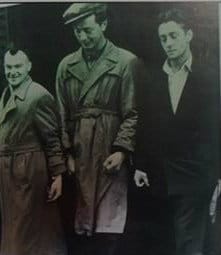
When at another time British prisoners tried to attack the Cypriots, the Irish built a protective wall around them and warned that any attack on the Cypriots would be tantamount to an attack on the Irish. Which would cause retaliation inside and outside prisons.
On February 7, 1957, nine other Cypriot fighters came to the prisons: Grigoris Grigoras, Vias Livadas, Sokratis Loizidis, Epiphanis Papantoniou, Evangelos Panagiotou, Andreas Savva, Thassos Sofokleous, Nikolas Loizou and Fotis Christofis. On September 13, 1957, the team grew with Nikos Samson and Nikos Sofokleous, while two months later Nikos Tsardellis, Yiannis Epaminondas and Michalakis Rossidis were also transferred.
A month later, the British separated the Cypriots into two groups and took them to Wakefield Prison near Leeds and Maidstone Prison in Kent.
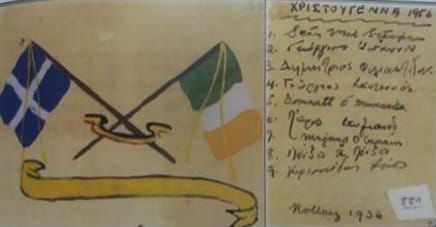
"We are fighting the same imperialism"
In Wakefield prisons, the Cypriots met again with IRA fighters. As soon as they arrived, Seamus Murphy, ran up and grabbed the hand of one of the Cypriots saying: “I'm proud to meet you. My name is Murphy, I am a member of the IRA, fighting the same imperialism as you.'
Wall fever
Escape plans had already begun to be made from Wormwood Scrubs prison, but the transfer of the Cypriots to other prisons foiled the plan. However, the "wall fever", as Seamus Murphy described it, the idea of escape was intense and so the plans continued. Even if they didn't succeed, they didn't give up. In 1958, a joint committee of Irish and Cypriots agreed to an escape plan which, if successful, would involve joint action.
This meant that EOKA and IRA fighters would flee to the mountains and continue the struggle against British colonialism and the Cypriots would hand over a list of traitorous Cypriots to whom the British had offered asylum. They would be executed by the Irish.
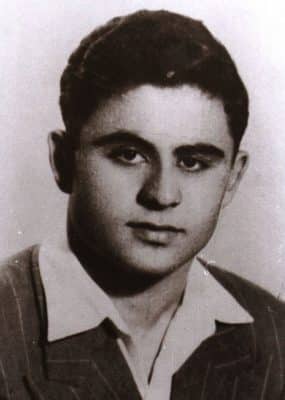
The connecting link Nikolas Ioannou
Nikolas Ioannou Outside the prison, Nikolas Ioannou, a student in London and representative of EOKA in England, offered significant help. His brother Giorgos Ioannou was in prison with the IRA fighters.
He had taken care of the successful outcome of the escape, while Katina Pilina, Nikos Samson's cousin, gave him the 500 pounds she had saved for a dowry. When on July 14, 1958, Nikolas Ioannou started his journey to Dublin on his motorcycle, he lost his life in an accident. A truck cut him off.
The designs he had on him disappeared. A few days later, the officer who went to arrest his sister, admitted that "we didn't intend to kill him, only to take the escape plans from him."
In the end, the escape plans of the fighters did not succeed. However, with the Zurich-London signings and the declaration of the Republic of Cyprus, the Cypriot prisoners were released under a general amnesty.
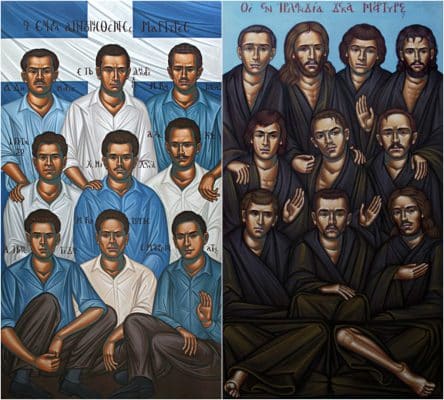
The relations of the fighters of the IRA and the EOKA were maintained for many more years. The Cypriots exchanged letters and made visits for many years, while many events were held where references were made to the special relations that the Cypriots developed with the Irish.
The Irishman Seamus Murphy in an interview in 1986 said "I want to give a message to the EOKA fighters. You live deep within my soul, in an unrepeatable era of struggle. Brothers, continue your fight unceasingly until victory".
Information: Lambros Kaoullas, 35th Issue National Guard and History, "When EOKA met the IRA: Cypriots and Irish in English prisons and the joint escape operation"
